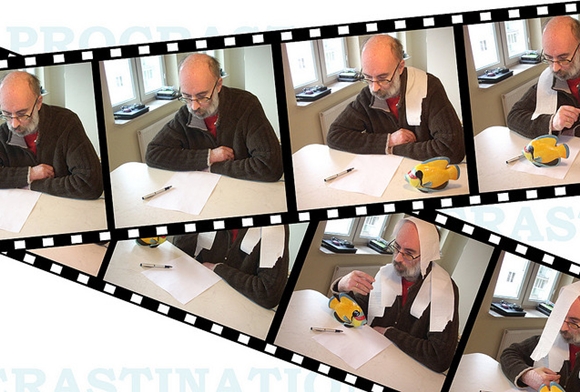

How many times have you sat in front of your computer, or your mess, or your appointment calendar, knowing that you needed to do something but were unable to make yourself do it? There’s always something more compelling or more urgent: the phone rings, or you remember an email you need to write. Suddenly you look up, and hours have passed.
What’s really going on?
Well, for one thing, work is hard. It takes effort. Some days, that alone is enough to send us off to one interesting blog post after another.
For serious procrastination problems, the cause is usually one of two things. You don’t want to do the task, or you’re afraid you can’t. Or both. Whether it’s getting rid of all the piles of paper and clutter at home or doing that big thing you hate doing at work, it’s hard to make yourself do something you really don’t want to do.
The system can reinforce our behavior. Not only does goofing off feel better than working in the short term, but things we don’t want to do often turn out to be unnecessary anyway.
What to do
When you find yourself procrastinating, take a hard look at the tasks. Do you see value in them? If not, what are the likely consequences of not doing them? Is there someone else you could delegate them to instead?
If you can’t delegate a task and you can’t handle the consequences of not doing it, then do it. Otherwise, move it from your to-do list to your to-quit list. Life is short–you can’t do everything, so don’t waste time on things that you hate unless they’re crucial.
But most of the time, the things we put off aren’t really hated tasks. We see the value in the task, or we know it’s work we’ll like once we get started, yet we sit, paralyzed.
When that happens, it’s usually because we’re afraid we can’t do it. The task is big or daunting, or the path to success is not clearly visible. In that case, start by taking a step back and realizing that’s what’s going on. Freaking out won’t help, and Facebook isn’t likely to, either.
In particular, if you spend energy thinking about how much time you’ve already wasted and how far along you think you should be by now, it will seem even more impossible to catch up, and you’ll just want to hide farther under the desk. You can’t go back and unwaste that time; all you can do is start fresh from right now. Let go of all of your previous lack of progress.
Also, let go of your excuses. If you hear yourself saying “I’m no good at this” or “I can’t do this kind of work,” stop. Is it true? (I often find myself giving excuses that are clearly untrue upon closer examination.) Even if it is true, can you see this task as a chance to learn and improve yourself, rather than a threat?
Once you clear away as much mental garbage as you can, it will be easier to start. Here are some tips:
- Stop worrying about making a perfect start. Just start somewhere.
- Make a plan. Planning isn’t “real work,” so it’s not as scary as the meat of the project, but it is very helpful for getting a handle on what needs to be done.Think about the project overall. Describe the goal to yourself in a few sentences. Write down all the major things that need to be done. Then start breaking those things down into smaller pieces. Keep breaking everything down until most or all seem doable, or at least concrete.
- Go through the list and pick the item that looks easiest to do right now. If nothing looks easy, break that list down some more, and find a tiny piece of a tiny piece that’s easy. Do it!
- Pat yourself on the back. You’ve started! That’s the hardest part.
- Build on your success: keep picking small tasks off the list and doing them.
- Admire your progress whenever possible and savor how good it feels to get things done.
You can use your success next time you have trouble getting started. Remind yourself how well you did this time and apply the same techniques. You’ve done it before, you can do it again!










